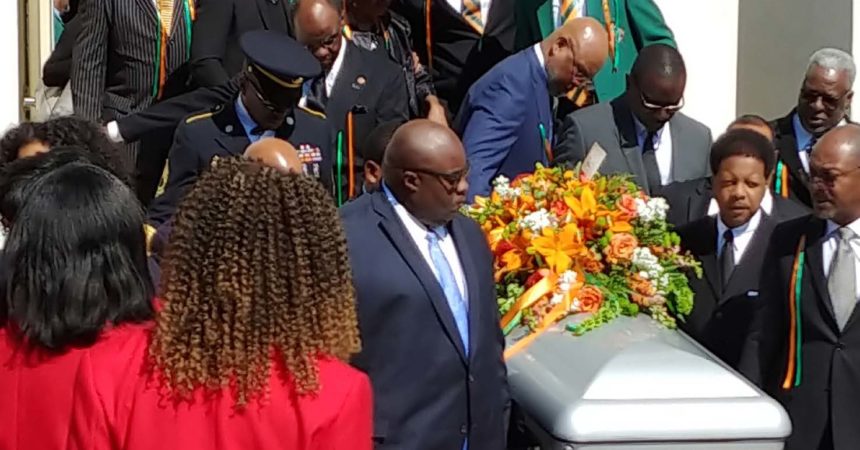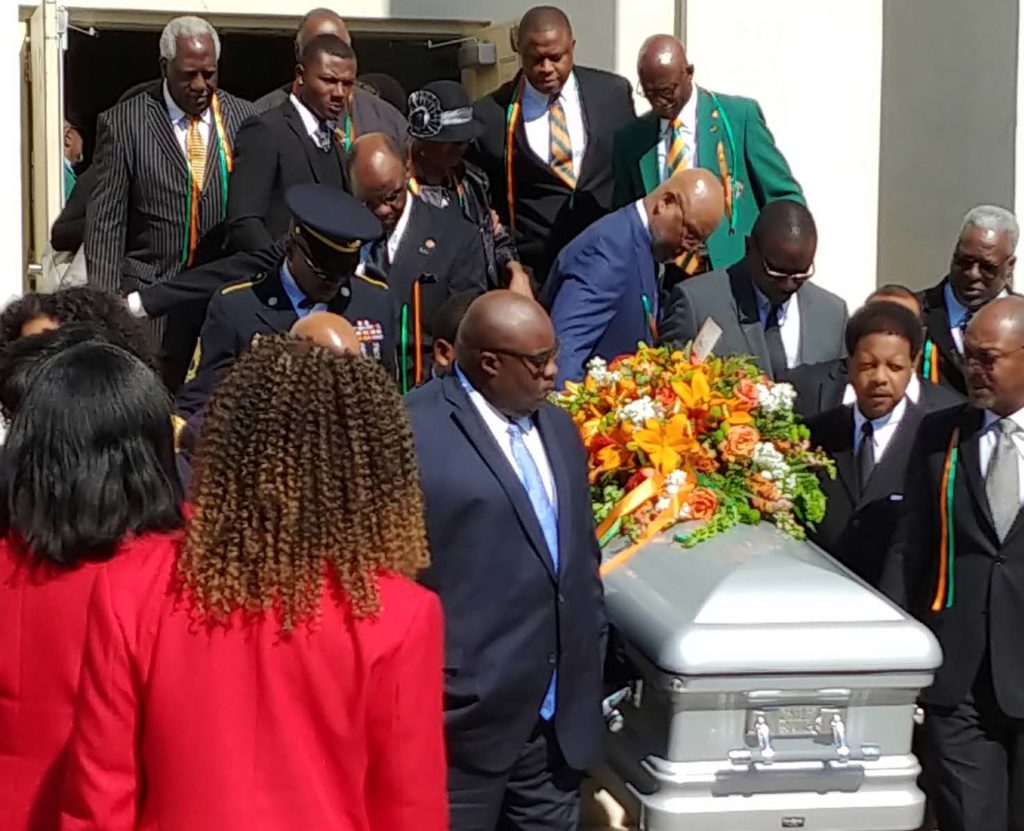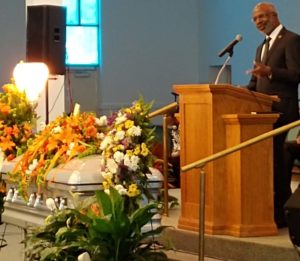
Friends, family remember Wilson as teacher, journalist

Members of Roosevelt Wilson’s family listened attentively to speakers at his funeral Monday. Photos by St. Clair Murraine
By St. Clair Murraine
Outlook staff writer

Hundreds of friends, government officials, and former co-workers joined with the family of Roosevelt Wilson this past Monday in one last celebration of his life.
Wilson, a former publisher of the Capital Outlook, also was hailed for his years as athletic director and journalism professor at FAMU, where he also served in several other positions.
Several stories were told at the Old West Florida Enrichment Center by his former students, including Atlanta’s Mayor Keisha Lance Bottoms, recalling Wilson’s influence on their lives.
Wilson died on Oct. 21 at the age of 78.
Wilson’s influence went beyond FAMU, an attribute to his style of going “against the grain,” as he titled his columns and a radio show.

FAMU President Larry Robinson tells of Roosevelt passion for the university.
Photo by St. Clair Murraine
FAMU President Larry Robinson called him “a citizen of the world,” who had become a treasure.
“You could see his imprint on the community through the work that he has done as a husband, a father and a member of the community,” Robinson said. “The story of Roosevelt Wilson’s contribution is yet to be told.
“It’s going to be told by the hundreds of students he’s impacted and touched over his career at Florida A&M University. You’re going to hear stories about him for many, many years to come.”
A portion of Wilson’s life was told in a video that featured him as a child growing up in New Smyrna Beach. There were scenes of his three children — Van Wilson, Vaughn Wilson, and Dr. Tiffany Wilson-Ardley.
Portions featured him with several other family members, including his wife, Cather Wilson, and their grandchildren.
While none of his immediate family spoke, they expressed their gratitude through longtime family friend Joy Bowen.
“This community is blessed to have had a person who could see and feel the needs of everybody and not feel that they should be disrespected for any reason,” Bowen said.
Through his writings and radio comments, Wilson often made it clear that he was the voice for those who didn’t have a platform to express their point of view.
“There is no better way to celebrate him but to say ‘thank you,’ ” said Lynn Thompson, VP of Intercollegiate Athletics at Bethune-Cookman University and one of Wilson’s childhood friends.
“Through his leadership, writing and publishing, he captured and told stories of our culture for generations to rely upon.”
Wilson and his wife purchased the Capital Outlook in 1991. He sold the Black newspaper in 2009 to Rev. R.B. Holmes, who delivered the eulogy.
Given the political climate, Holmes said Roosevelt would have been at the forefront expressing his displeasure over some of the political tactics in an election year.
“We have come here this morning to celebrate the life of a man who knew the importance of truth; who spoke the truth; who wrote the truth and lived by the truth,” Holmes said. “That is the legacy of Roosevelt Wilson.”
Teaching his journalism students how to present the truth in their writing had become Wilson’s trademark.
He taught just that to his students, who learned “how to tell the truth, live the truth, be about the truth, write the truth, (and) publish the truth,” Holmes said.
After moving to Tallahassee, his first job at FAMU in 1969 was director of sports information. He’d previously worked as an English teacher and sports writer in Ocala.
He and Eddie Jackson, a former FAMU employee in athletics and administration, quickly became friends.
“Once you got to know Roosevelt, you had to like him,” Jackson said, proving his point by mentioning how Wilson took nine months to earn a master’s degree in communications from FSU. “He was intelligent. In fact, he was one of the smartest people I’ve ever met.”
Wilson’s ties to FAMU were strong. That much rung through in the narrative of his book “Agile, Mobile, Hostile: The Biography of Alonzo S. Jake Gaither,” which he wrote with assistance from one of his former students, Yanela McLeod.
Gaither was FAMU’s legendary football coach.
Wilson’s passion for FAMU went beyond sports. Robinson recalled that in 2012 when the university was experiencing one of its most trying times, Wilson stepped up and changed the narrative.
“He lightened the load,” Robinson said, “by insuring that we got the story out about FAMU.”







